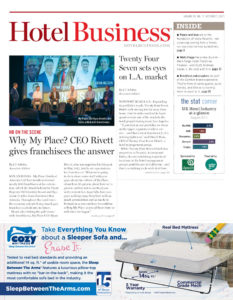SAN FRANCISCO—Gone are the days of the tourist trap. Guests want more than just local experiences—they want to feel like they’re part of the neighborhood. These days, it’s not enough for hotel concierges to give guests tips on the hottest new restaurants or venues—guests want to visit places that are off the beaten path, where the natives go. Certainly, hotel concierges—locals themselves—have this information ready to go, but guests usually aren’t aware of this until they get there—well after they’ve booked. And with Airbnb and other home-sharing sites offering up authentic, local experiences, Arrivedo has come up with a solution to help hotels before guests make their choice.
Alonso Franco, co-founder/CEO, Arrivedo, noted that hotels are facing a huge threat from home-sharing sites. “The modern traveler right now is thinking of neighborhoods, and even within that neighborhood, he’s seeking local experiences. The traveler is thinking, ‘What can I do around the hotel?’” he said. “This is our solution: one neighborhood guide for every hotel in the world. We are inviting every hotel to organize their local experiences, giving them a voice as host, something no one has done in the hotel space.”
Winner of the People’s Choice Award at this year’s HITEC Toronto, Arrivedo is an online platform for hotel recommendations designed to give a voice to hoteliers. Essentially, hotels can create their own neighborhood guide, highlighting the best things to do around the hotel. A travel writer interviews the hotel concierge—or appropriate person at the property—and crafts a best-of guide for guests, which connects to Foursquare, giving readers information like the address, phone number, price range and ratings of the recommended establishment.
According to Franco, there are several benefits to Arrivedo: It helps hotels fight back against home-sharing sites to attract travelers looking for local, personalized experiences; it increases the reach of the hotel’s local knowledge; it solidifies the hotel’s reputation as a local host; and it gives a voice to hoteliers and establishments, ranking them based on the quality of their recommendations and not just a price tag.
“We have invited a huge amount of travel writers, and they are reaching out to hotels, and hotels are paying writers to get interviewed,” Franco said, noting Arrivedo recommends paying the writer about $200. “Travel writers can write well but the knowledge is in the experienced concierge, the marketing manager or even the owner of the small hotel, and he himself wants to craft these personalized experiences. It takes about an hour and then the travel writer goes into our content management system and crafts this information.”
Hotels can choose to highlight whatever they’d like. For instance, Hotel Hugo in New York City offers guides titled “The Route of an Everyday New Yorker,” “NYC Nightlife on the Lower West Side” and “Must-Have Experiences at Hotel Hugo,” which highlights the property’s offerings. Meanwhile, Shaftesbury Hyde Park International offers “One Day in London: Top Attractions,” “Pubs Nearby: Ales, Food & More” and “London Culture: Museums, Galleries & More.”
Franco explained that if something happens—for instance, a restaurant closes—“all of that information is coming from Foursquare, so the updates are automatically done. If a restaurant closes, the hotel can easily update the recommendation.”
The guides are available on Arrivedo’s website—which also includes a Book Direct button—and can be included on a hotel’s own site, enabling the property to fully highlight the neighborhood when guests are still in the research stage.
Hotels can also use the guides at check-in, sending them to guests via email. “The moment the traveler arrives, he receives this info of what’s best in the neighborhood,” Franco said, noting that sometimes work gets busy for the hotel concierge. “Instead of communicating with one or two guests, he can be communicating with dozens of guests at the same time, in addition to the face-to-face time.”
Last month, the company launched a meta-search engine on its website, which takes into account the neighborhood guides when it ranks hotels. “It’s a new way of organizing hotels not only by reviews but also by neighborhood content,” Franco said. “This will help hotels compete with Airbnb by a content strategy that helps them acquire users who are searching for experiences near their neighborhoods and areas. We want to make it super easy for hotels, but we don’t want to create a new bucket of information; we want to help them out appeal to the traveler now going to Airbnb.”
He added, “One important feature we are adding to our neighborhood guides at the end of this year is that travelers will be able to comment on the neighborhood guide, so we build this strong community of what is best to do around a particular hotel.”
Some 400 hotels in 70 cities are currently partnered with the online platform. “We are going to target a goal of 35% of global hotels with neighborhood guide content for 2019, but on top of our value proposition of acquiring users we have a second value proposition to hotels: use this content to engage with customers,” Franco said, noting the company is focused on large cities, but any hotel can benefit. “The advantage of starting in urban markets is that we can outreach to millions of travelers at once. We plan to grow and entice hotels city by city, so we congregate a lot of hotels in a single destination. However, that technology right now is accessible to any hotel in the world in any destination.
“Hotels need to shine as local hosts,” Franco continued. “We want to match this trend we’re seeing of figuring out what’s around the area before guests decide to book. It’s the merging of content to book. Content needs to be contextual though; it can’t just be keywords—it’s real experiences that entice me to book a particular property.” HB


